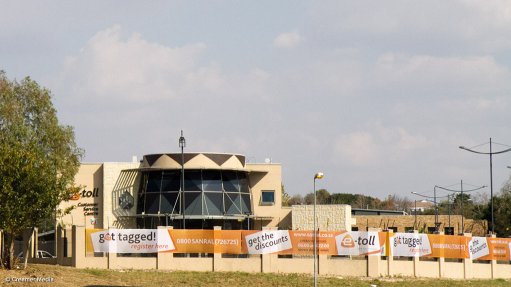
Photo by: Duane Daws
South African National Roads Agency Limited (Sanral) continues to hit back at critics of its controversial Gauteng e-tolling programme, declaring that only 17% of revenue collected through e-tolling would go towards the cost of managing the toll operation and collecting toll fees.
The remainder would be channelled to “a variety of needs linked to the road”, including servicing the loan incurred to complete the first phase of the Gauteng Freeway Improvement Project (GFIP).
“The 17% covers all costs associated with collecting tolls, including salaries, bank transaction costs, toll infrastructure maintenance costs, telecommunications costs, postage costs and municipal rates and taxes incurred by the operating company Electronic Toll Collection (ETC).
“This reflects the payment the toll operator receives in terms of tendered rates,” Sanral GM for communications Vusi Mona said in a statement on Thursday.
He highlighted that the remainder of the revenue would be used to repay the initial capital cost of the road upgrades, road maintenance, interest payable on debt and operational costs related to overhead lighting, as well as to pay for intelligent transport systems and incident management services.
“In addition, there are other costs related to the violation processing. However, these costs are self-funding through the higher toll tariffs applicable to violators,” he noted.
Sanral’s statement followed allegations by opponents of the system that the cost of collection was “too high” and that the money paid by South Africans would go directly to the Sweden-based developer of the e-toll system, Kapsch.
ETC was a joint venture in which the Swedish traffic technology company held 65%, while South African Traffic Management Technologies held the remaining 35%.
“All the money paid by road users will go into the Sanral account. Sanral has an ad-measure contract with ETC, which will now operate tolling on behalf of Sanral. The contract stipulates that ETC will be paid for actual services rendered, not a retainer or a fixed contract fee,” said Mona.
Sanral held that, having an ad-measure contract in place, meant that ETC was paid for services monthly and that payment was strictly made according to a bill of quantities as specified in the tender contract. Only dividends declared could be paid to the foreign companies involved.
In addition to this, the South African Reserve Bank had to be satisfied that all foreign currency control regulations had been met.
Mona argued that it was “total disinformation” for opposers of the e-toll system to interpret a statement made by Kapsch, in which it referred to the R700-million in revenue it expected to acquire from the GFIP, and assume that this amount indicated profit.
“The argument that money will go overseas is, therefore, simplistic and misinformed. If we add the normal internal administrative costs, payment to service providers, plus salaries, one understands that funds could only be [channelled] to its foreign partners if ETC declared a profit,” he said.